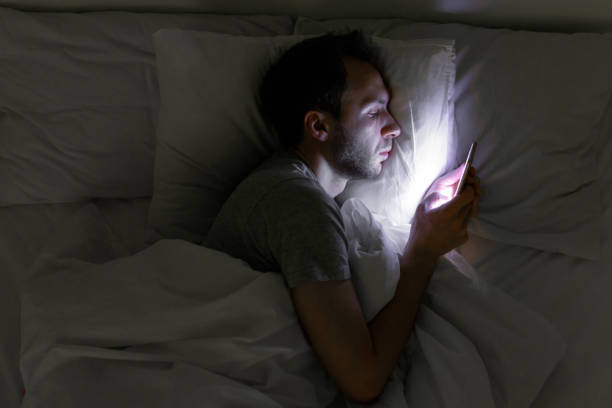For years, sleep medicine specialists have warned about the potential negative effects of using electronic devices just before bed. The concern seemed to center on the blue light from screens or stimulating content, but a recent study broadens the scope of the problem and conclusively confirms it: using a cell phone in bed significantly reduces sleep.
The study, conducted in Norway with over 45,000 university students, further confirms that using a phone in bed reduces sleep. This sleep disruption from excessive screen use before bed is known as “Digital Insomnia.”
How Using Your Phone in Bed Reduces Sleep
The study, published in the journal Frontiers in Psychiatry by the team led by Gunnhild Johnsen Hjetland, aimed to analyze how different types of screen use affect sleep duration and the onset of insomnia symptoms. Using data from the national Students’ Health and Wellbeing Study (SHOT 2022), which included students between the ages of 18 and 28, the researchers observed that 87% of participants used electronic screens in bed.
The data showed that screen use after bedtime is associated with a decrease in total sleep time and a higher prevalence of insomnia. In concrete terms, each additional hour of cell phone use in bed was associated with a 24-minute reduction in total sleep time and a 59% increase in the likelihood of experiencing insomnia symptoms.

One of the study’s unique features was that it didn’t limit itself to measuring screen time but also investigated the specific activities students engaged in while in bed. The researchers divided the participants into three groups: those who used social media exclusively, those who used social media in combination with other activities (such as watching TV shows, listening to music, or studying), and those who didn’t use social media but did use other cell phone functions.
Contrary to expectations, the results showed no significant differences between activities. That is, the negative impact on sleep was more closely linked to using a cell phone in bed than to the type of content viewed. Screen time was the most determining factor: the more screen time, the poorer the quality and quantity of sleep.
Surprisingly, the group that used social media exclusively showed a lower proportion of insomnia symptoms and longer sleep duration than the other groups. According to the authors, this could be explained by two hypotheses. On the one hand, those who used social media exclusively may be more socially integrated, which has a protective effect against sleep disorders.
Meanwhile, those with severe sleep difficulties may deliberately avoid social media because they have identified it as a disruptive factor.
Why Using a Cell Phone Causes Sleep Loss
The article proposes four possible mechanisms by which cell phone use in bed affects sleep:
- ① Sleep displacement: Time spent using a cell phone directly overlaps with time that could be used for sleep.
- ② Light exposure: Light from screens can interfere with the production of melatonin, a key hormone for regulating the sleep-wake cycle.
- ③ Increased arousal: Many digital activities, especially interactive ones, increase cognitive or emotional arousal and make it difficult to fall asleep.
- ④ Nighttime interruptions: Notifications or messages can wake users up even after they have fallen asleep.
Of these factors, the study gives the greatest weight to the first: “Our results can be interpreted as support for the displacement hypothesis,” the authors stated. The reduction in sleep appears to be explained more by the time stolen from rest than by light or content.
How to Avoid This Problem then?
In light of these results, the authors propose that public health campaigns shift their focus from specific types of content to reducing overall screen time in bed.
Still, they acknowledge that individual experiences vary widely: for some young people, screens may act as tools for relaxation or companionship. Therefore, the next step for research will be longitudinal monitoring of these behaviors in real-life contexts and over extended periods.
Cell phone use in bed can no longer be seen as a harmless routine. Evidence indicates that it is a habit with direct consequences on sleep health. Faced with a college-aged generation that sleeps less than recommended and lives with increasing levels of fatigue, anxiety, and insomnia, this relationship deserves attention, prevention, and broader social discussion.





